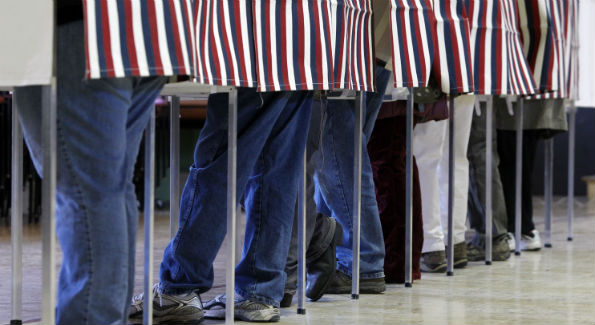Did Election 2012’s negative and divisive tone lead to a more informed public?
By Sarah Valerio

Strategists across the board agree that even if voters don't like the way the campaign game is played, they should still cast a ballot. (AP Photo/Toby Talbot)
This article began as a look back at moments that defined the election. In context, however, political strategists point out that these moments seemed small in light of the important issues hinging on this election.
President Barack Obama and Governor Mitt Romney’s campaigns were widely criticized for staging one of, if not the most negative and divisive elections in history. With its negative tone and constant barrage of attack ads as well as a disregard for facts, it is no wonder that pollsters are predicting lower voter turnout than in recent presidential election cycles.
There was Obama’s oft-quoted “You didn’t build that” remark, taken out of context and placed front and center for the American public in Republican TV ads. Similarly, the emergence of the “47 percent” video from an unnamed guest at a private Romney fundraiser fanned the flames that the Obama campaign lit early on with ads portraying Romney as an out-of-touch rich guy with a complete lack of empathy for the average American. It worked. The campaigns wouldn’t use these methods if they weren’t effective.
Repeatedly, the lofty rhetoric from both sides was lost in new waves of attacks.
Romney’s selection of tea party darling, Rep. Paul Ryan as his vice presidential pick was, according to team Romney, supposed to make the campaign about “big issues.” Obama’s “hope and change” slogan became an altered vision: “Forward.” This at times seemed like mere lip service against the backdrop of his Bain capital attack ads and Romney’s criticism of Obama’s first term.
Neither campaign really pivoted toward a forward-looking viewpoint until the final days in their endgame strategies. The Romney campaign put out an economic plan cited by many as completely unrealistic, while the Obama campaign recently released its plan — 20 pages with more pictures than a children’s book — only after poor post-debate polls necessitated it.
Republican strategist Ron Bonjean pointed out that the campaigns repeatedly squandered chances to really educate voters, an opportunity both sides had at the conventions.
The Republican National Convention was memorable solely in how completely forgettable it was, save for Clint Eastwood’s performance, in which voters learned that even an empty chair can upstage Romney. It didn’t give Romney any post-convention bounce. In contrast, the Democratic National Convention was hailed as a success, giving Obama a two to three point bounce in the polls. Both succeeded only in rallying their respective bases, rather than closing the gap with independents or providing any in-depth information about the candidates.
The debates provided another opportunity for Obama and Romney to speak candidly to the public. Instead, viewers were treated to zingers and rhetoric. The debates and subsequent commentaries’ distinctly style-over-substance focus led to jokes about “binders full of women” and “horses and bayonets” instead of any serious discussion about fair pay and foreign policy.
“There were lots of high-profile shallow moments that didn’t get into the substance,” he said. “Every voter has a responsibility to educate themselves on the candidates. There has been enough information out there for them to make decisions despite the shallowness of the campaign atmosphere.”
Ideas can get lost in messaging, sound bites, and attempts to fit them into 140 characters, as Democratic strategist and Fox News contributor Jehmu Greene pointed out. Ideas can get lost by pundits who, rather than bearing the burden of educating the public on the issues, engage in a race to the bottom to see who can write the most extreme opinion or say the most explosive thing to get the most TV air time.
Campaigns drew criticism for trading respect for popularity, truth for volume, and facts for talking points. Calls to step up and elevate the discourse appeared unheeded. The message and the issues were getting lost in the noise.
“Though our founding fathers didn’t want regular folk who could be easily provoked by passion to run the show, Twitter gave them a megaphone and the campaigns obliged,” said Greene. “Before the soaring rhetoric we’ve heard from President Obama and Governor Romney in the closing days of the campaign, both men succumbed to the most irritated and loudest members of the political peanut gallery.”
Political pundits question whether we had a campaign worthy of the American people, but seem to find common ground in that the decision to vote today should not turn on that. They agree that there are two distinct candidates with two distinct visions, and while voting may not change the discourse, it can change the very course of our country.
“We will know if voters were well served by Election 2012 if whoever ultimately wins the White House brings Congress together to solve America’s most pressing fiscal problems,” said Republican strategist and former Presidential campaign adviser Ford O’Connell.
The more distasteful aspects of campaigning and political coverage are all part of the game. Voters may not like all the rules, but strategists agree that doesn’t mean they should sit this one out.
Today, there are calls for voters to be bigger than the moment. Maybe in the future, political campaigns will be, too.




